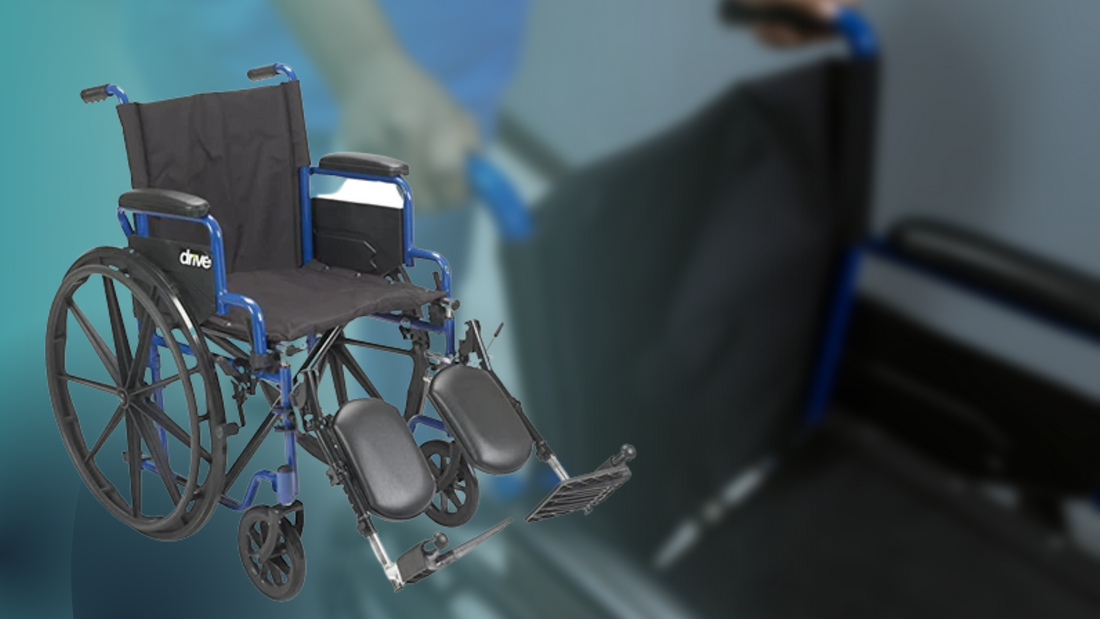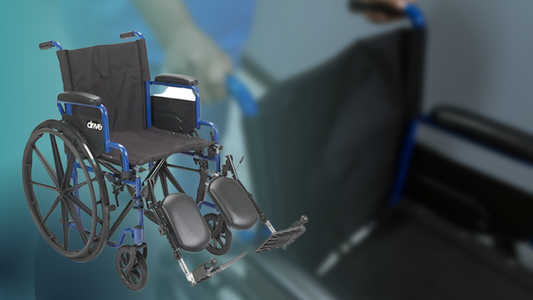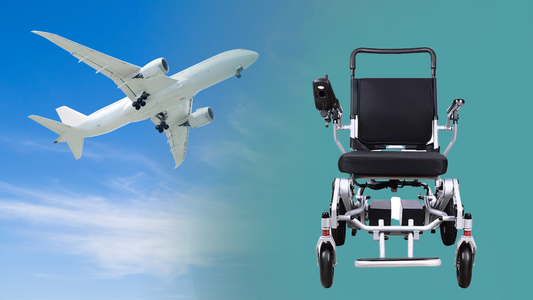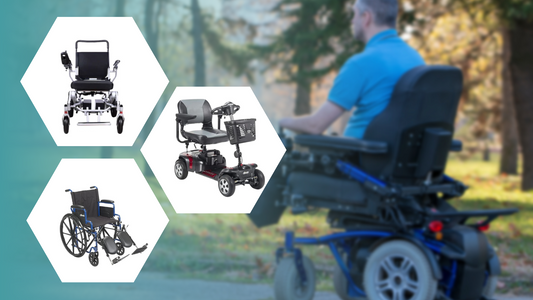Have you been browsing the internet searching for the most suitable wheelchair? If yes, perhaps all of your searches have led you to a dead end with no certain answer. You might be stuck on what to choose: an electric wheelchair or a non-electric wheelchair. Do not fret ! You are in the right place. This article will guide you through the pros and cons of both types of wheelchairs. The article aims to make your wheelchair-buying experience easier.
Wheelchairs are more than just a piece of equipment – it is a health aid that provides the necessary comfort for those individuals who are unable to walk. Considering the importance of such a mobility aid, you should first do some research. The reason behind conducting research is to understand that wheelchairs come in all sizes, shapes, and electric or non-electric!
Regardless of the different types of wheelchairs, here we are going to focus on an electric vs. a non-electric wheelchair. This article will also discuss the pros and cons of buying each, and you can see a variety of options here.
What is an Electric Wheelchair?
An electric-powered wheelchair is commonly known as an electric wheelchair. It is a seat, typically 17 inches by 18 inches (45 x 46 cm) on four wheels with one or two electrical motors attached underneath. The batteries are rechargeable, and there is often a controller that allows the rider to increase or decrease their speed and change directly.
Like any other mobility aid, an electric chair has pros and cons. A few of the key pros and cons are described below.
PROS
A few pros of investing in an electrically-powered wheelchair (and, why you should choose it) are as follows:
User-Friendly
Among the most obvious advantage of an electric wheelchair is that it is easy to use. If you speak to owners of an electric wheelchair, you will usually hear them tell you that they love it. Having motors underneath the seat doesn't require the ride to use any effort to propel it forward, making it both comfortable as well as fun. There are some more advanced electric wheelchairs for people with serious conditions that may have controllers which can be controlled by the user's mouth or any other body part. This is very convenient for those with partial command over their hands. Generally, electric wheelchairs are quite easy to maneuver around.
Non-Tiring
As mentioned, an electric wheelchair merely requires control over buttons. This means that the wheelchair user does not have to put in effort or strength. Not having to put in personal strength limits over-exerting yourself. So, if you are looking for a wheelchair that saves your energy, an electric wheelchair is definitely the one that you should be looking for!
Limited Mobility
Some wheelchair users often do not have full control over various body parts. Thus, they often have trouble using a manual or a self-propelled wheelchair. If you are one of these users, don’t worry! An electric wheelchair does not demand much movement. Your ability to move would not be an issue.
Comfortability
A very common feature of an electric wheelchair is the comfort it offers. Most wheelchairs of this kind have extra comfortable padding, which offers great support and allows you to sit comfortably for hours on end. This can also provide pressure relief, which prevents the rider from getting over-heated or developing any ulcer.
Cons
With every pro, there is a con. Similarly, an electric wheelchair, despite its many advantages, may have some drawbacks for you depending on your situation.
More Expensive
Unfortunately, one drawback of electric wheelchairs is that they are more expensive. A sturdy, dependable manual wheelchair can cost between $250 and $750. While an electric wheelchair can cost between $2,500 and over $3,000. At Elite Scooters, we price our electric wheelchairs affordably at under $1,800, with the same quality, performance and durability of electric wheelchairs priced at over $2,500. We also offer financing to make the price more affordable. But it is still an inescapable fact that an electric wheelchair will cost more than a manual one.Non-foldable
Usually electric wheelchairs are cumbersome and non-foldable. This makes it very difficult to travel with them or take them on a plane. At Elite Scooters, we offer our Elite Electric Wheelchair which is foldable, and is also Airline-Approved to take on a flight. But many other electric wheelchairs are not, an this is a big consideration when buying one.
Transport-unfriendly
Buying an electric wheelchair may also restrict your travel. This is mainly because it is not only non-foldable but also heavy. So, if you love traveling, then an electric wheelchair might not be suitable for you. At Elite Scooters, our Elite Electric Wheelchair is significantly lighter in weight than most other electric wheelchairs, weighing under 60 pounds. It is also foldable, which means that it can fit in the trunk of your car, even if you drive a compact. If 60 pounds is too much to life, we recommend having a friend of loved one help you pick it up or take it out of your vehicle. But even at 60 pounds, this electric wheelchair is significantly lighter than others which can reach 125 pounds upwards to 250 pounds. So please keep this in mind when making your purchasing decision.
What is a Non-Electric Wheelchair?
As the name indicates, a non-electric wheelchair is a manual wheelchair that is not propelled by any external power. Rather, it requires the rider to put in his or her own self-power to move the wheelchair forward.

PROS
Among the many advantages of a non-electric wheelchair, the most common ones are described below!
Lower Hassle
Obviously, a manual wheelchair does not require a battery. No battery means never having to worry about recharging.
Convenient for Transport
Unlike an electric wheelchair, a manual wheelchair is considerably easier to transport. They are extremely lightweight and can also be pulled apart (that is, folded). This feature enables the user to carry it around with them – whether it is down to a local beach or on a flight!
A Form of Exercise
Wheelchair users already have limited access to mobility. As a result, it makes sense to ensure that their upper body engages in physical activity. The easiest manner of doing so is for them to use a manual wheelchair. The main reason behind this is quite obvious: Manual wheelchair needs the rider to put in their own effort to maneuver it around. This will keep the user's upper body engaged in activity.
CONS
Nevertheless, manual wheelchairs have cons of their own. Some of them are below:
Upper-body injury
It has been proven that with excessive or repeated use, manual wheelchair users end up with upper-body injuries. Most notably, the shoulder muscles are pushed into great exertion and force. Putting in force all day to move yourself around might tear your muscles or harm them causing injury. If someone already has lower body mobility problems, the last thing that they want is to develop upper body problems.
Lack of Independence
Another disadvantage of using a manual wheelchair is the lack of independence. For riders who not awnt to self-propel their wheelchair all day, or who may have limited upper body strength or control over their hands, a manual wheelchair will require someone else on their behalf to push the wheelchair around. The use of a third person's strength and their constant need for them reduces an individual's sense of independence.
Problematic for long distance
Manual wheelchairs are not as accommodating for long distances. For a long journey, the rider of the wheelchair or the person pushing them may tire. The last thing that a manual wheelchair rider wants is to tire out in the middle of a trip, and then have to ask a passerby for help to push them back. On the other hand, some electric wheelchairs have ranges of 10+ miles, which is 4-5x farther than the distance the average American walks in a day!
Also, if there is an incline or hill, it may be too difficult or too dangerous to navigate over it or around it.
The Final Word
Once you have reviewed all of the pros and cons of electric versus non-electric wheelchairs, you may still be stuck. After all, both of them have different advantages and disadvantages and may be suited to different situations. In the end, it will come down to you: what you need. Do you need to travel a lot? Do you need to travel for long distances? Are you someone who does not want to over-exert themselves while pushing their wheelchairs around? Do you not want to have to be reliant on someone else to push you? Would you prefer investing in an electric wheelchair that will last you for many years?
After seeing thousands of people use both manual and electric wheelchairs, we do recommend an electric wheelchair as their owners often fall in love with them. It turns the act of getting around into something fun and promotes getting outside and being more active and independent. When making a decision, you shouldn't just ask yourself where you are today - but you should also ask yourself where you will be in 5 or 10 years. While an electric wheelchair can be a pricey investment, it will last you long into the future and keep you active and involved with friends and around town. At Elite Scooters, we offer our signature Elite Electric Wheelchair, that is perfect for the person looking for mobility, convenience, and portability.
And, so the question remains: Electric or Manual Wheelchair: What to choose? Leave your thoughts and comments below, we'd love to hear!




